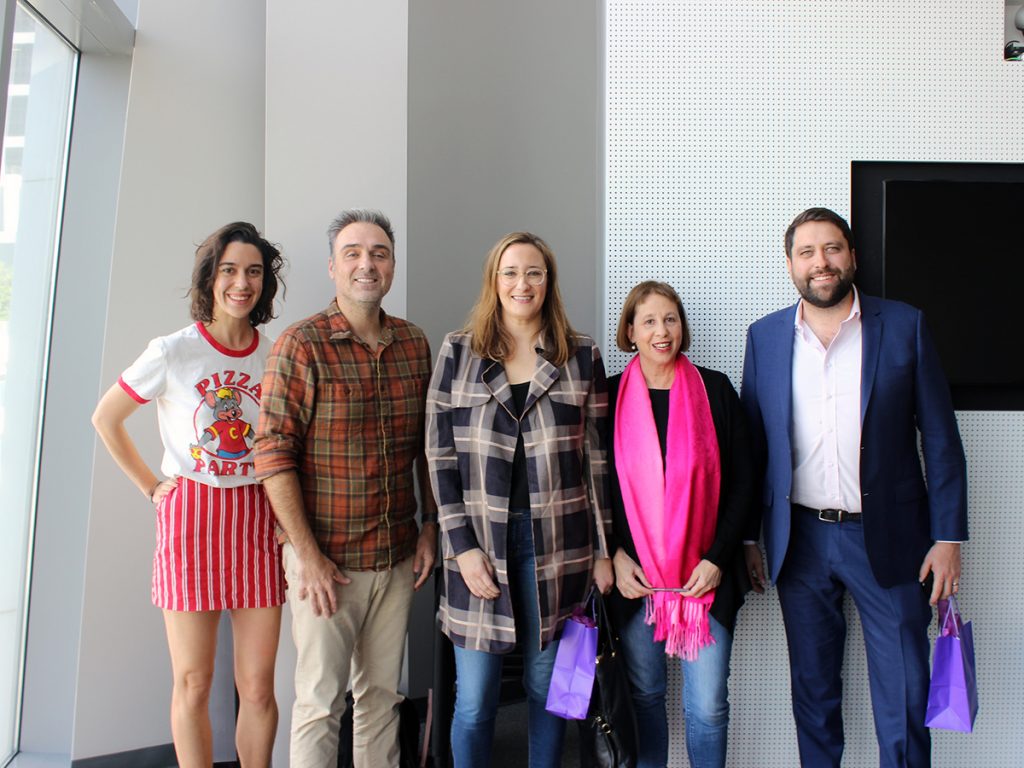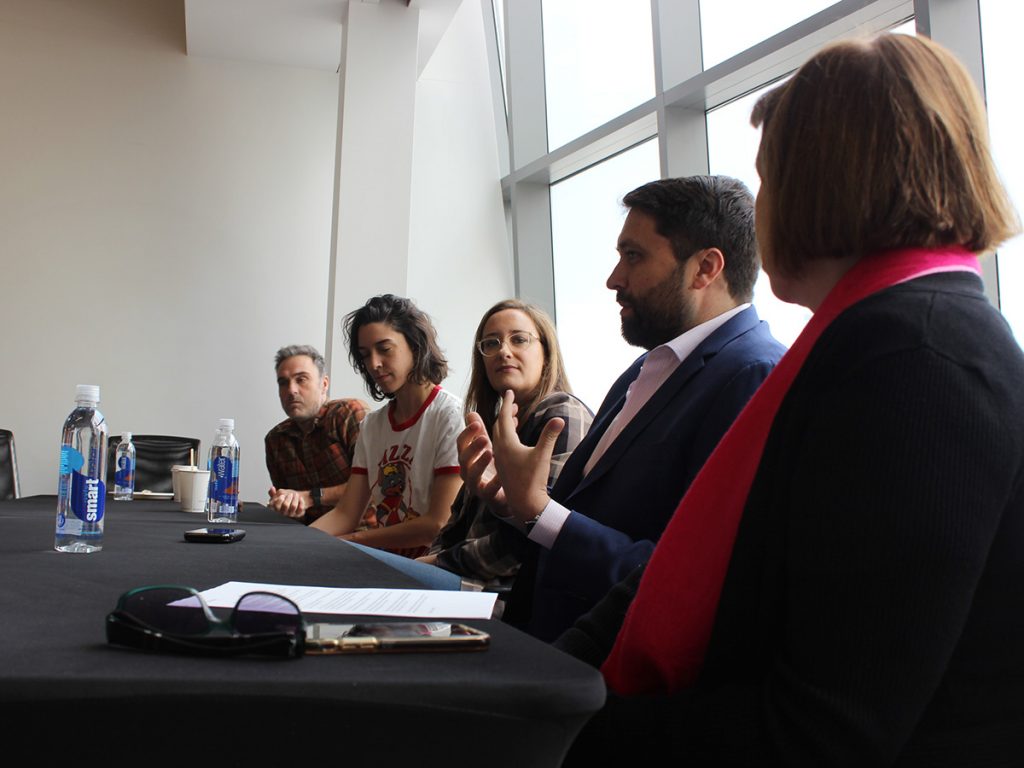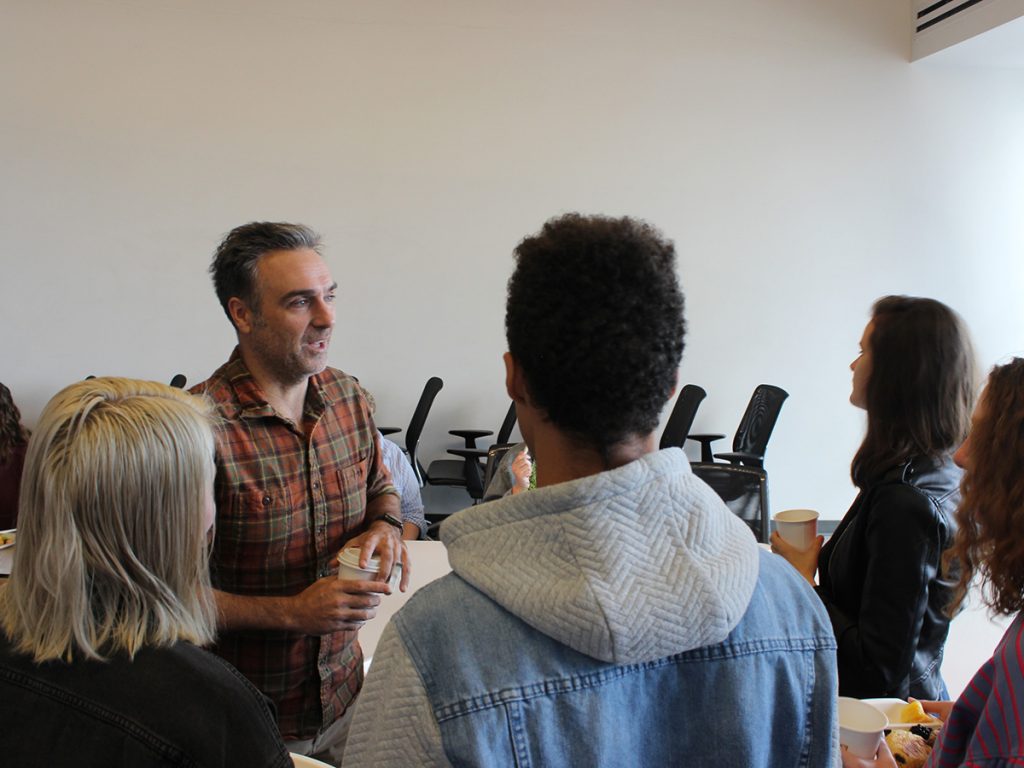Comedic Arts Majors Peek Into Future During Careers in Comedy Panel

By Erin Hattamer ’20
Soon-to-be graduates of Emerson’s Comedic Arts major, the first degree of its kind in the nation, joined four alumni working in comedy for a discussion filled with laughs and advice at Emerson College Los Angeles on November 2.
Panelists included Dicky Eagan ’95, writer on The Tonight Show Starring Jimmy Fallon; Adam Ginivisian ’07, comedy agent and partner at ICM Partners; Dina Hillier ’00, head of development at Counterbalance Entertainment and former vice president of comedy development at Paramount; and Jamie Loftus ’14, a stand-up comedian, animator, and writer on Robot Chicken. The panel was moderated by faculty member Martie Cook, creator and director of the Comedic Arts program.
Before the event, Cook shared a message from Rob Sabal, dean of the School of the Arts, who encouraged students to pay it forward as they pursue their careers. She kicked off the panel with the question: “What does it take to make it in the comedy business?”
“Three keys: talent, luck, and persistence,” said Ginivisian. “You only need to two to make it.”

Ginivisian said it’s important to not get caught up in comparing yourself to others and to not be in a rush to do anything but be good. When asked about how to talk about controversial topics in comedy, he told the audience to really think about what they want to say.
“Be a good person,” said Ginivisian. “You can talk about controversial issues if you’re thoughtful and kind.”
For the students in the audience aspiring to work in comedy, Hillier drilled home the message that they can learn something from any situation. No matter what title they have, Hillier said, people would recognize their value.
“Your first job will likely be as an assistant,” said Hillier. “You’ll learn what to do or maybe more importantly, what not to do.”
Hillier encouraged the audience to continue to flex their creative muscles while working, so that when the moment strikes, they’d be ready. When asked about what makes her say yes to certain scripts as a TV development executive, Hillier said it’s all about the voice.

How does one develop voice? Eagan told the audience to try different things, even if they don’t necessarily succeed at all of them.
“By failing, [I found] what I wasn’t good at,” said Eagan.
As a late-night TV writer, Eagan said writing comedy about politics at this time can be frustrating but also an opportunity.
“It’s a challenge to figure out,” said Eagan. “You have to raise your game.”
When it comes to branding, Lotfus said it’s not a math problem with a simple answer. She told students to talk about things they find funny and write about what matters to them.
“If you’re funny and you know what to do, you will find a platform,” said Loftus.
That advice sparked Hannah Cairo ’19, a graduating Comedic Arts major, to ask panelists about the importance of social media in comedy and how to use it effectively.
“Writer’s write. Actor’s act. Comics comic. Do it, and do it now,” said Ginivisian, who told students that if you’re good, you will be found no matter what platform. “There are so many avenues to use and apply what you’ve learned.”
Many of the panelists encouraged students to support each other as they embark on their careers.
“Put yourself in the orbit of other talented people,” said Eagan.
Among the students heeding the panelists’ advice was Mairead Ganley ’20.
“I was reminded that the hustle is the most important thing,” said Ganley.
That was advice hammered home by Hillier, who said that she would be intrigued to see folks with BFA degrees in Comedic Arts.
“It shows you have a love of comedy and a passion for it. You’ve done so many things,” said Hillier, referring to the writing, performing, and producing that Comedic Arts students will have completed upon graduation. “But at the end of the day, it’s about getting out there.”
AJ Tiereny ’19 said the panel showed her, and other Comedic Arts majors, that their careers could vary in many exciting ways.
“We got an in-depth view into the job possibilities and different roads to getting the careers we want,” said Tiereny.
Categories